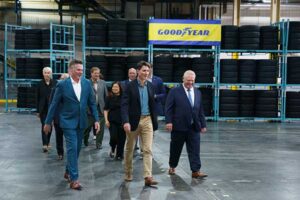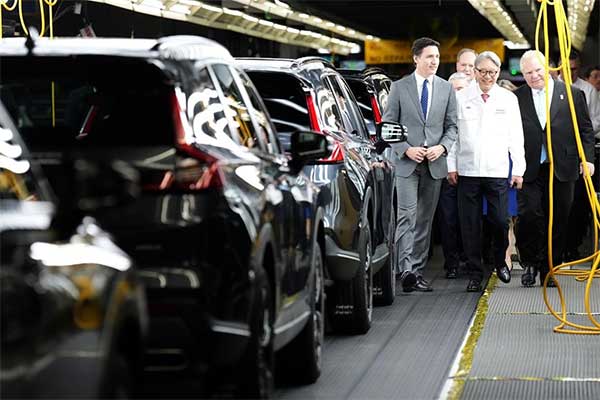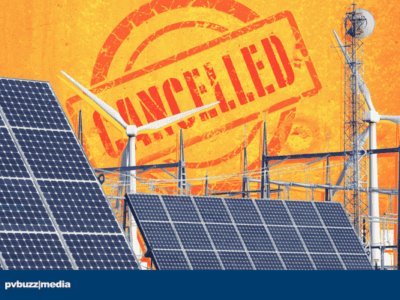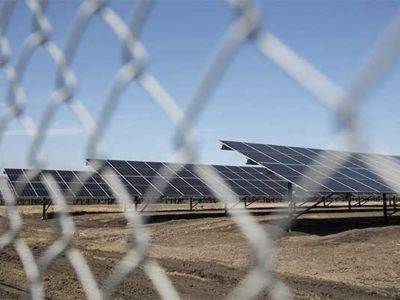- Canada has slapped 100% tariffs on Chinese electric vehicles, echoing similar U.S. measures aimed at curbing China's state-backed EV exports.
- As tensions rise between the two nations, what will this mean for the global automotive industry and Canada's green transition?
- Is this just the beginning of a new trade war?
In a bold move to protect its domestic industries and counter what it perceives as unfair trade practices, Canada has announced a 100% tariff on imports of Chinese electric vehicles (EVs). The decision aligns with similar measures taken by the United States, which recently imposed identical tariffs to stem the influx of Chinese state-subsidized EVs into North America.
Protecting Domestic Industry

Canadian Prime Minister Justin Trudeau and Ontario Premier Doug Ford tour Goodyear’s Napanee facility as the company announces a $575 million investment to expand production of tires for electric and all-terrain vehicles. (Shared on Canadian Prime Minister Justin Trudeau’s LinkedIn)
Canada’s decision comes as part of a broader strategy to safeguard its burgeoning electric vehicle industry and the jobs it supports. With over 125,000 Canadians employed in auto manufacturing, the government has heavily invested in transitioning the sector towards electric vehicles, funnelling billions of dollars into domestic EV production and battery supply chains.
The government’s strategy mirrors that of the United States, where the Inflation Reduction Act has provided significant incentives for green industries. This approach has successfully attracted major players like Goodyear, Honda, Stellantis, and Volkswagen, who are enticed by subsidies to set up or expand their operations in Canada.
At a press conference in Halifax, Trudeau emphasized the need to take action against what he described as China’s overproduction and state subsidies in the EV sector, which he argues are distorting the global market. “Unless we want to get in a race to the bottom, we have to stand up, and that’s what we’re doing,” Trudeau declared.
New Tariffs and Trade Restrictions
In addition to the 100% tariff on Chinese EVs, Canada imposed a 25% surtax on imports of Chinese steel and aluminum products, effective October 15. The EV tariffs, which will take effect on October 1, will apply to a range of vehicles, including electric and certain hybrid passenger cars, trucks, buses, and delivery vans.
To further protect its domestic market, Ottawa has also restricted eligibility for EV incentives to vehicles manufactured in countries with which Canada has free trade agreements, effectively excluding China from these benefits. This move is part of a larger effort by Canada to reduce reliance on Chinese imports, especially in critical sectors like electric vehicles and minerals.
International Response and Implications
China reacted swiftly to Canada’s announcement.

Increased energy demand in China comes from the steel and iron industries, which have produced record output in recent months. (Kevin Frayer /Unearthed)
The Chinese embassy in Ottawa expressed “strong dissatisfaction” with the new tariffs, labelling them as “typical trade protectionism” and a politically motivated decision. The embassy warned that this move would harm trade relations, negatively impact Canadian consumers and businesses, and potentially slow down Canada’s green transition.
The tension between Canada and China reflects broader geopolitical shifts and rising protectionism in global trade, particularly in industries deemed critical for future economic growth. As Canada doubles down on its efforts to build a robust domestic EV sector, the question remains whether these protective measures will foster long-term growth or trigger retaliatory actions that could disrupt global supply chains.
A Strategic Gamble?
While the new tariffs may bolster Canada’s electric vehicle industry in the short term, they also risk straining diplomatic and economic ties with China, a key trading partner.
The effectiveness of these tariffs will largely depend on how other countries, particularly the United States and European Union, respond to similar challenges from China. With the global automotive industry in flux, Canada’s decision underscores nations’ complex balancing act in promoting domestic industries while navigating an increasingly interconnected world.














Comments